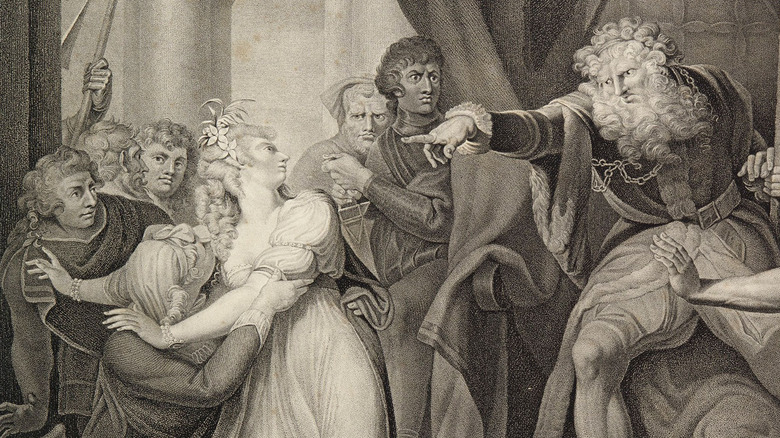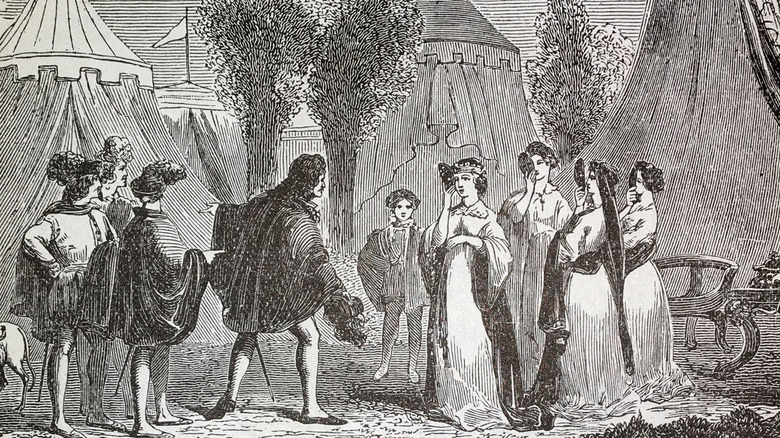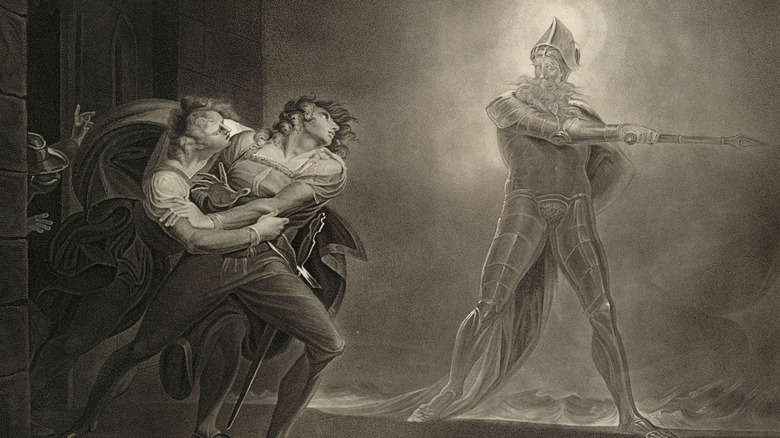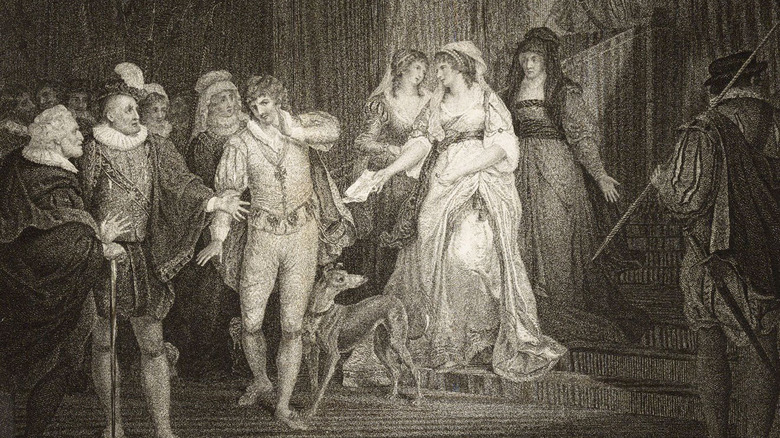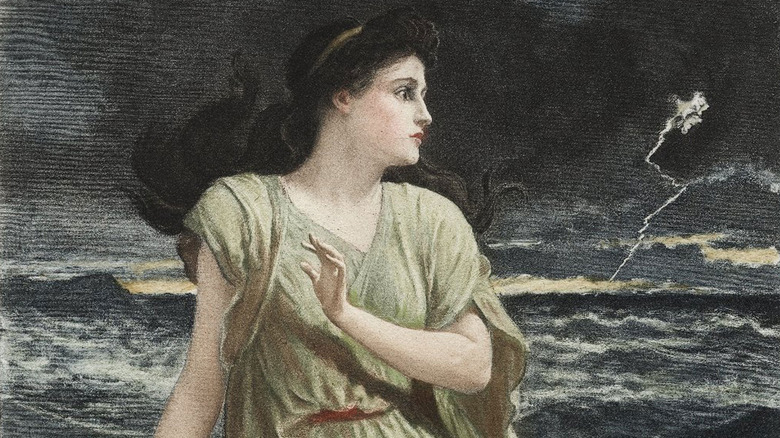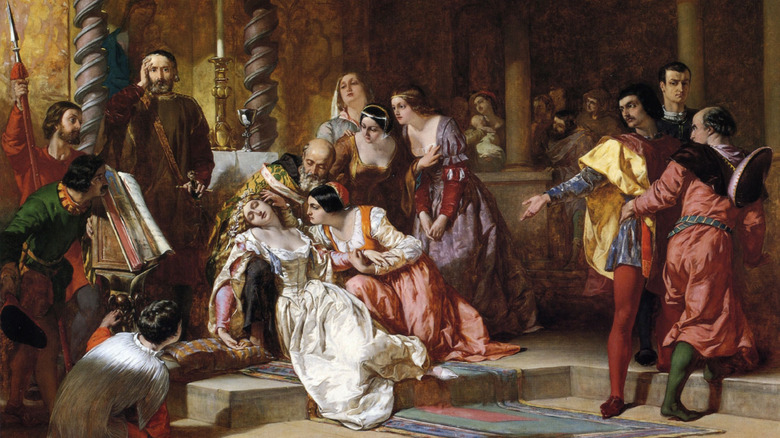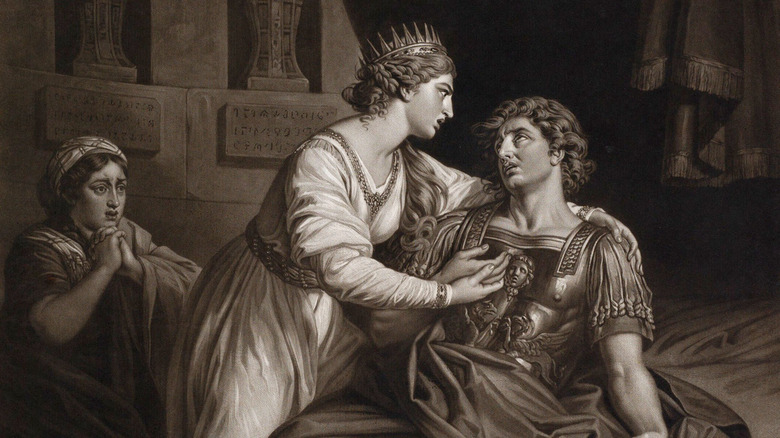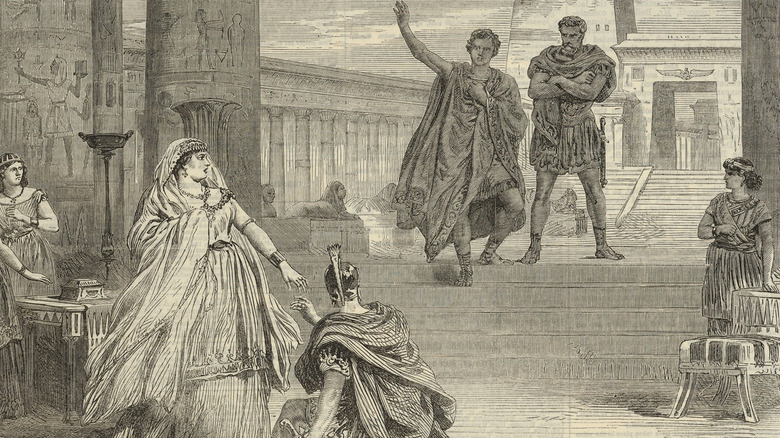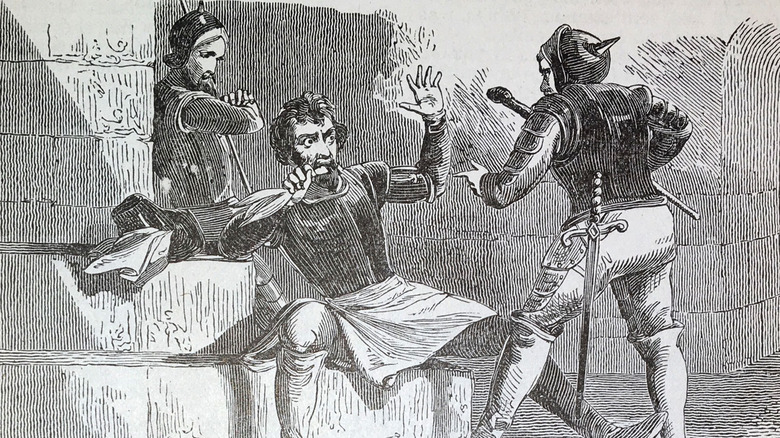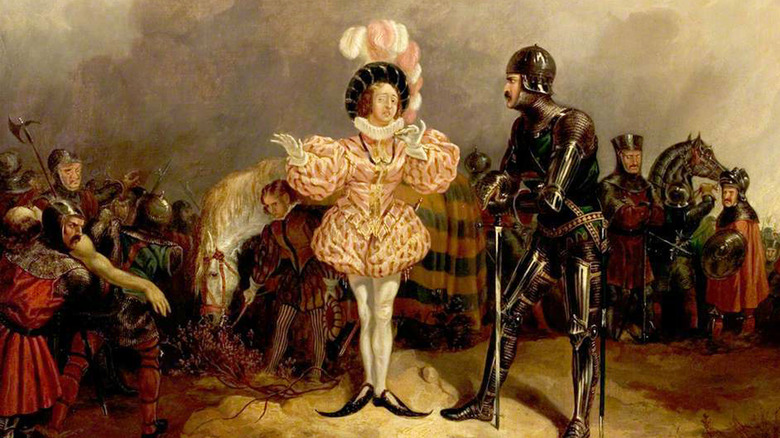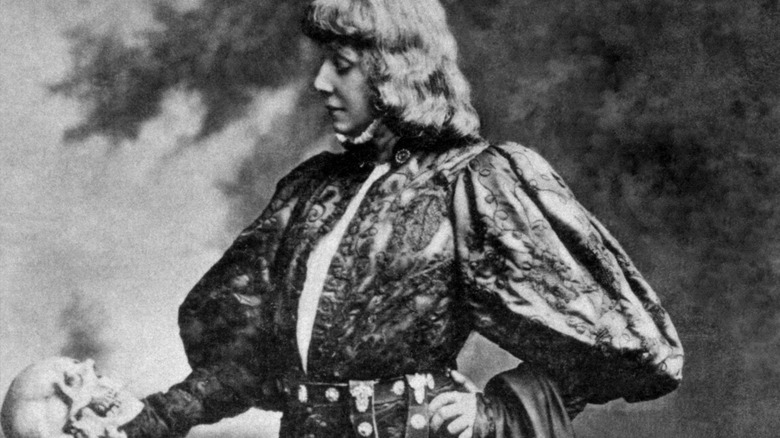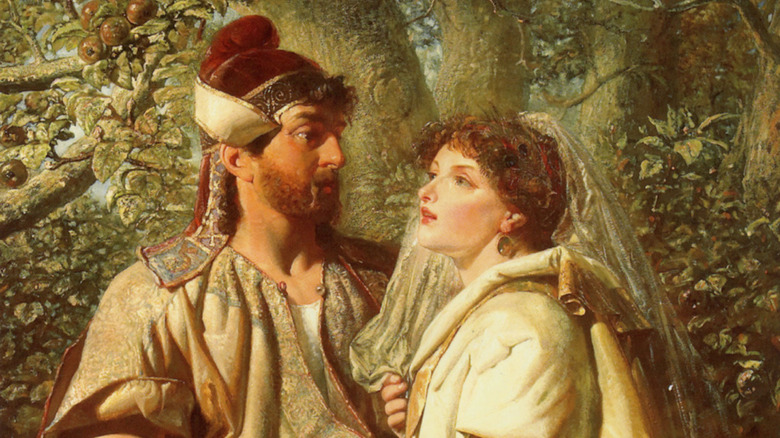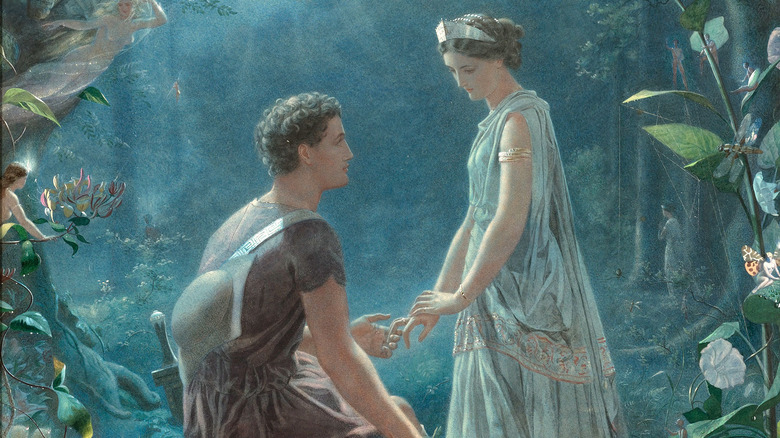Words In Shakespeare's Works No One Understands Today
Many writers have left their mark on the English language, but few have done so quite as indelibly as William Shakespeare. A 16th-century playwright and poet so legendary that he's known simply as "The Bard," Shakespeare is credited with inventing a plethora of words. Many of them are still among the thousands — over 170,000 – of words that officially make up 21st-century English. As Words of Obscurity notes, around 1,700 words are attributed to Shakespeare!
Exactly how many words were actually coined by Shakespeare is still a point of contention, though. Some were likely in everyday use in Elizabethan England, with Shakespeare's plays being the earliest official record of them. All the same, Shakespeare created new vocabulary in very distinctive ways. Mental Floss notes a few everyday 21st-century words that are originally attributed to Shakespeare and that follow his characteristic style. Shakespeare liked to join words together, add prefixes and suffixes, and use words in unexpected ways (for instance, nouns being used as verbs). Some notable words are eyeball, inaudible, bedazzled, and belongings.
Shakespeare's famous plays are strewn with fast and loose vocabulary like this, often carefully placed so that an audience can catch the meaning purely from the context, even when the words themselves are unfamiliar. For all the Shakespearean words still used today, though, there are many more which never quite caught on. It's interesting to realize that these words may well have sounded just as outlandish when they were first spoken on stage as they do to modern ears.
Smilets
To say that "The Tragedy of King Lear" is not a cheerful play would be a gross understatement. Indeed, many consider it Shakespeare's most depressing, a brutal story of despair and cruelty, exploring ideas about justice, authority, and reconciliation. As Sparknotes mentions, this play was once "thought too bleak to perform," even though it's now widely considered one of his best works. The story is based on a legendary king of England, the titular King Lear, and his decision to step down from the throne and divide his kingdom between his three daughters, and the terrible events which ensue. In the midst of King Lear's dirge, however, is a surprisingly sweet little word: smilets.
It's used in a line during Act IV Scene III, in which an unnamed gentleman remarks on the queen, saying, "Those happy smilets that play'd on her ripe lip seem'd not to know what guests were in her eyes." It's a short exchange, highlighting how she seems to hide her feelings with faint smiles, even when her eyes tell a different story. The Collins English Dictionary lists the word smilet as, simply, "a little smile."
Infamonize
One of Shakespeare's early plays, "Love's Labour's Lost" is a farce comedy with a premise sounding almost like something from a 2000s high school movie. As the Royal Shakespeare Company explains, it revolves around Ferdinand, King of Navarre, and his three companions, all of whom are determined to avoid romantic interests for three years to focus on their studies. Their plans are thrown into chaos, however, when the Princess of France visits the king's court with an entourage of ladies.
A line in Act V Scene II is spoken by Don Adriano de Armado, a Spaniard visiting the king's court, as he confronts a character named Costard. In anger, Armado says, "Dost thou infamonize me among potentates? Thou shalt die." Infamonize may sound unusual, but it's a perfect example of Shakespeare using a common word in an uncommon way, taking the word "infamous" and turning it into a verb. According to the Collins English Dictionary, it simply means "to make infamous."
Mobled
This word is mentioned in what is by far the most famous of Shakespeare's plays, "The Tragedy of Hamlet, Prince of Denmark." As Sparknotes explains, it's "widely regarded as the most influential literary work ever written." As with many of the greatest works of fiction, it grapples with some deeply human fears, like death and uncertainty, actions and their consequences. Act II Scene II of Hamlet sees the titular prince watching a play within a play, about the Trojan War. One of the actors says the line, "But who, O who, had seen the mobled queen."
The meaning of this line isn't entirely clear, with Hamlet and Polonius remarking on the phrase themselves. Academics have even spent some time considering what exactly the significance of this line is, as in a sociology study from David Publishing. According to Merriam-Webster, the word "mobled" means "being wrapped or muffled in, or as if in, a hood." In other words, the mobled queen is shown as a veiled figure, her face hidden from view, in keeping with the play's running theme of uncertainty.
Braid
The word "braid" is familiar in the modern world, but Shakespeare uses it with a confusingly different meaning in "All's Well That Ends Well." This is one of Shakespeare's so-called problem plays. Screen Online explains that these stories, while comedies, tackle the "complex moral issues" of human life. All's Well That Ends Well, in particular, gives a rather cynical view of sexual attraction, particularly from the male characters. One confusing line is from a character named Diana, who speaks disparagingly of the main character Bertram. She says, "Since Frenchmen are so braid, marry that will, I live and die a maid."
Historically, what exactly Shakespeare meant by the word "braid" in this line is a long-standing mystery. Mental Floss briefly discusses the confusion this line has caused. One notable figure to get involved in the debate was Samuel Johnson, author of A Dictionary of the English Language in the 18th century. Johnson considered that the line might mean deceitful, related to an old Scots word, "braidie," which means crafty or cunning. Whether or not this is the correct meaning, however, remains unknown.
Foison
The word "foison" is used a couple of times in Shakespeare's works and is definitely unfamiliar to modern ears. One example is in "The Tempest," a story about justice, power, and mercy. In Act II Scene I, the character Gonzalo speaks the line, "But nature should bring forth, of its own kind, all foison, all abundance, to feed my innocent people." This happens as Gonzalo is describing his vision for how he would want life to be if he were in charge of the island they're shipwrecked on — before being soundly ridiculed by his traveling companions.
The word "foison" seemingly refers to plenty or abundance, as Gonzalo speaks about how glorious his island could be. The Oxford Education Blog mentions this word, noting that it also appears in "The Tragedy of Macbeth." In Act IV Scene III, Malcolm is speaking about his doubts over whether he's fit to be king, and Macduff says, "Do not fear; Scotland hath foisons to fill up your will," speaking almost boastfully about how Scotland will be more than enough for Malcolm to rule over. While it may rhyme with poison, the word foison clearly means anything but!
Eftest
Eftest is another of Shakespeare's more baffling words. It comes from the play "Much Ado About Nothing," in Act IV Scene II, when Dogberry says the line, "Yea, marry, that's the eftest way. Let the watch come forth." Dogberry, as Mental Floss points out, is a character known for speaking in malapropisms, with blundering misspoken words for comic effect. The problem, however, is that it's not entirely clear what word Dogberry thought he was saying. The meaning, from context, seems to be something like quickest, neatest, or possibly most convenient. Whatever this word was really intended to mean, however, is another of Shakespeare's mysteries.
Shakespeare was extremely fond of clever wordplay in his works, and Much Ado About Nothing is a stand-out example of this. A comedy revolving around love and romance, the text is littered with metaphors, puns, malapropisms, and innuendoes, all contributing to what Sparknotes describes as one of Shakespeare's best comedies. The title itself is actually a joke, but one which modern audiences won't recognize. ZME Science explains that, in Elizabethan times, "the word 'nothing' was slang for female genitalia." In other words, the title of the play is a crafty double entendre.
Immoment
Immoment is the kind of word that looks like it should exist, even if the exact meaning isn't obvious. It comes from another of Shakespeare's most famous plays, "Antony and Cleopatra." Shakespeare was fond of writing plays about historical events, and this one was set in the final days before the Roman Republic became the Roman Empire. Mark Antony was one of the rulers of Rome, and the story is about a love affair between him and Queen Cleopatra of Egypt. It's noteworthy too, that Cleopatra is "one of Shakespeare's strongest, most awe-inspiring female characters" (per Sparknotes).
In Act V Scene II of the play, Cleopatra says the line, "Say, good Caesar, that I some lady trifles have reserved, immoment toys, things of such dignity as we greet modern friends withal." The word "immoment" may be unfamiliar, but this is one word that's obvious from the context. As Shakespeare's Words explains, it simply means "unimportant" or "inconsequential." Seemingly, it's an inversion of the word "momentous."
Disponge
Found in "Antony and Cleopatra," disponge is an unusual but wonderfully descriptive little word. It's mentioned in Act IV Scene IX of the play, set in Caesar's camp. It's a brief but dramatic scene that focuses on the death of Enobarbus, one of Antony's lieutenants. In the previous battle, Enobarbus deserts Antony and switches sides to fight against him. Antony orders that Enobarbus' personal belongings be sent to him and Enobarbus is so overcome with shame and remorse at his actions that he gives a heartfelt speech about how history should remember him as a traitor and a villain, before dying of a broken heart. In one of his final lines, he says, "The poisonous damp of night disponge upon me."
This is another word that is clear from its context. As Shakespeare's Words explains, it means "to rain down or pour out, as if from a sponge." It paints quite an evocative image, and it certainly matches the abject melodrama of Enobarbus' final monologue.
Congreeted
Congreeted is a strange old word, defined by the Collins English Dictionary as "(of two or more people) to greet one another." It's used in "Henry V," another of Shakespeare's historical plays. Near the beginning of Act V Scene II of the play, in the French king's palace, the Duke of Burgundy is speaking with King Henry and Queen Isabel, and says the line, "That face to face and royal eye to eye, you have congreeted." Another interesting part of this line is the use of the word "you," showing that Burgundy is speaking to both Henry and Isabel. As Shakespeare's Words explains, in Shakespearean English, "you" was a plural word, used more formally to address more than one person (much like the modern French word vous). In other words, Burgundy is acknowledging a greeting from both of the royal guests.
"Henry V" is noteworthy for being part of a quadrilogy of plays about English history. As Kansas City Public Library explains, this set of stories is often known as the Henriad. In it, the character Henry Bolingbroke (better known as Henry IV of England) rises to prominence during the play of "Richard II," becoming the troubled protagonist of "Henry IV" – part 1 and part 2 – before Henry V explores the better fortune of his son's turn as monarch.
Sneap
A peculiar sounding word, sneap is another one from the Henriad, this time from Part 2 of "Henry IV." Act II Scene I is about Sir John Falstaff, in a favorite bar of his, where he has substantial unpaid debts. At the request of the landlady, two police officers attempt to arrest Falstaff for his non-payment. Taking offense at this, Falstaff replies, "My lord, I will not undergo this sneap without reply."
A sneap, according to the Collins English Dictionary, is "a scolding or reprimand" and the word was once used as either a noun or a verb. Falstaff, clearly, was not pleased with having to deal with the consequences of his actions. While the word is no longer used in the same way that Shakespeare once did, an identical word can still be heard in some parts of the UK. In some local dialects, to sneap means to nip at something.
Friending
Using familiar words in strange ways was one of Shakespeare's long-standing quirks, and one interesting example is the word "friend," used not as a noun but as a verb. In the modern world, the word "friended" is familiar to anyone who's ever used Facebook, but Shakespeare preempted this by a few centuries. In "Measure for Measure," Act IV Scene II, the character Duke says the line, "When vice makes mercy, mercy's so extended, that for the fault's love is the offender friended." The word is used again in Act II Scene III of "Cymbeline," when the Queen says to Cymbeline and Cloten, "Frame yourself to orderly soliciting, and be friended with aptness of the season." The word "unfriended" is seemingly never used by Shakespeare, but it's one which he would no doubt have approved of.
In "Hamlet," Shakespeare uses a different conjugation for the word. At the end of Act I, the Danish prince himself says the line, "And what so poor a man as Hamlet is may do t'express his love and friending to you, God willing, shall not lack." In these closing lines, Hamlet is addressing a ghost that is haunting him, giving assurance that he means no ill will. Seemingly, "friending" refers to the act of being a friend.
Mirable
After Shakespeare wrote a scene in Hamlet featuring a play about the Trojan War, he evidently liked the idea so much that he proceeded to write an entire story set during the Trojan War. According to the Royal Shakespeare Company, the play "Troilus and Cressida" was written around the same time as "Hamlet." The Trojan War was evidently a popular historic event in Elizabethan England, and Shakespeare was probably influenced by a couple of other works: a poem by Chaucer called "Troylus and Criseyde," and "The Testament of Cresseid," written by Robert Henryson.
In Act IV Scene V of "Troilus and Cressida," a group of mythical Greek heroes is in conversation. Hector refers to Neoptolemus using the word "mirable." It may sound at first like another way to say admirable, but the word "admirable" is also used elsewhere in the same play. The Collins English Dictionary explains that mirable actually means "marvelous" or "wonderful." A fitting word, given the lavish praise Hector is giving to Neoptolemus.
Hiems
At the ending of "Love's Labour's Lost" comes a curious little line: "This side is Hiems, Winter; this Ver, the Spring — the one maintained by the Owl, th' other by the Cuckoo." This is the first line of a grand finale, in which the entire cast of the play returns to the stage to perform a song about spring and winter.
Hiems, it turns out, is a personification of winter itself. It may also be a quiet reference to the works of the Roman poet Ovid. Ovid also wrote about Hiems as winter personified, and a line of his writing is mentioned in the Routledge Revivals book "Ovid." It reads, "et glacialis Hiems canos hirsuta capillos," which translates roughly to "and icy winter with gray bristly hair." Shakespeare's Globe elaborates further, noting that Hiems is also mentioned in Act II Scene I of "A Midsummer Night's Dream," where Titania mentions "old Hiems' thin and icy crown."
Egregious
The word "egregious" is a commonly used part of 21st century English, but it wasn't always used with the deeply negative meaning it now has. As Shakespeare's Globe mentions, the word was formerly used to refer to something excellent or exceptionally good. Over time though, the meaning of the word gradually mutated. Merriam-Webster discusses this, mentioning that the literal meaning of egregious was something that stands out from a herd. It originally meant something outstanding, noteworthy, or remarkable.
Shakespeare may have had a hand in this word's shift in meaning. The word is mentioned twice in the play "Henry V." In Act IV Scene IV, the character Pistol is speaking with a French soldier, and says, "O Signieur, thou do give to me egregious ransom." Pistol is using the word mockingly in this scene, taunting the soldier he's facing off against (although this soldier seemingly doesn't speak any English). Pistol also uses the word earlier in the play too, in Act II Ecene I, where he addresses someone as "Egregious dog? O viper vile!" with much the same level of sarcasm.
Despite the word's early meaning, Shakespeare used it in a distinctly modern way, although he certainly wasn't the first to do so. As Columbia Journalism Review notes, the word "egregious" was already being used ironically in 1566, when William Shakespeare was still a baby, but the plays he went on to write no doubt helped to popularise the sarcastic meaning.

